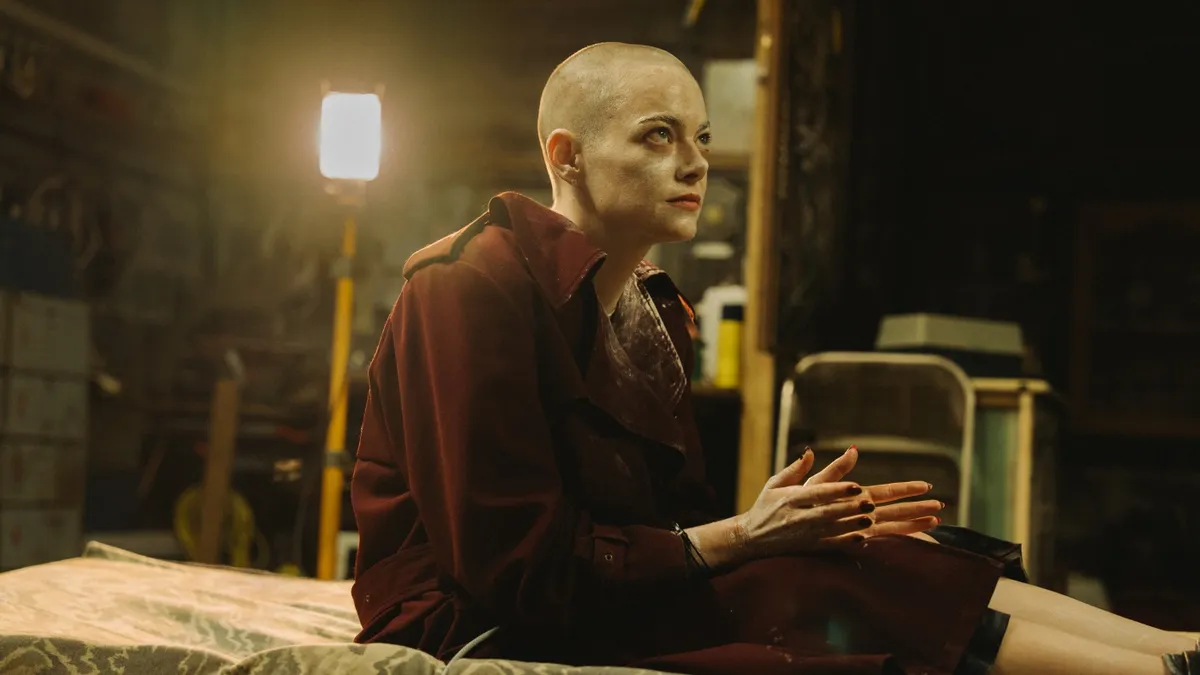
As the end credits began to scroll at my screening of Bugonia, the audience sat silently in the darkness for several long seconds. This latest film from director Yorgos Lanthimos follows Teddy (Jesse Plemons), a gritty conspiracy theorist, who, alongside his cousin Don (Aidan Delbis), kidnaps Michelle (Emma Stone), a determined Big Pharma CEO. Teddy is convinced that Michelle is an alien, leading to an unsettling narrative that unfolds in ways only Lanthimos can deliver.
It’s not uncommon for a movie to lull an audience into a moment of collective contemplation. Such silences can take various forms: stunned, thoughtful, or laden with emotion. However, Bugonia is distinctly a Lanthimos film, which explains why, at its conclusion, the audience was compelled to sit in silence before a lone voice broke through the gloom: “The f*, it shouted, was that?” As a fan of Lanthimos' work, I found myself grinning. For those who appreciate his unique cinematic style, that cry of confusion enhances the moviegoing experience, turning it into a shared journey rather than a solitary one.
Many of Lanthimos' previous films have evoked similar responses, as he often explores themes of bleakness and despair. This is simply his artistic identity: where Steven Spielberg embodies childlike wonder, Lanthimos captures the stark realities of the human condition. Despite having created films that have garnered both audience and critical acclaim, his core sensibility is not tailored for mainstream success, and that's precisely why many of us admire him even more.
Walking into a Lanthimos film, you expect some resistance from viewers who prefer a more conventional cinematic experience. But here's the twist: the audience member who shouted at my screening of Bugonia had a valid point. While I found the film enjoyable, particularly until its last three minutes and 37 seconds, it ultimately falls into the mid-tier category of Lanthimos' work. This is mainly because it lacks the pure expression of his signature cinematic style.
The reason some of Lanthimos’ films, such as Dogtooth (2009), The Killing of a Sacred Deer (2017), and The Lobster (2015), feel more impactful than his Oscar-nominated works like The Favourite (2018) and Poor Things (2023), lies in his collaboration with longtime co-writer Efthimis Filippou. When Lanthimos directs and co-writes, he showcases a consistent and characteristic style that features intentionally stilted dialogue delivered with a flat affect. This approach often renders his characters incapable of expressing the intense emotions simmering just beneath the surface.
The bleakness in his films is reminiscent of the comics of Charles Burns and Chris Ware — an unutterable, dark humor that feels both total and inexorable. In Bugonia, however, written by Will Tracy, Lanthimos cannot fully utilize his trademark style, as the story necessitates a more naturalistic approach. He aims to present Michelle as a fully realized, empathetic character, trapped in a basement and forced to navigate her captors’ unpredictable moods. Emma Stone shines in this role, adeptly portraying a woman who reads her captors’ intentions with precision while skillfully negotiating her path to freedom.
However, there is an undeniable coldness in Bugonia — a detachment that works effectively in films like The Lobster and The Killing of a Sacred Deer, where it helps to define the film's unique world. In this latest film, though, that same directorial remove feels out of place, creating a barrier between the audience and the characters that dulls our emotional responses.
This distancing effect is exacerbated by Lanthimos' frustrating tendency to limit interactions between his two leads. Bugonia is structured around a series of alternating close-ups of Stone and Plemons, which creates a choppy rhythm that hampers genuine exchanges. While Teddy and Michelle engage in a battle of wills, their conversations lack the dynamic interplay that characterizes true dialogue. Instead, we witness a series of monologues rather than an authentic exchange of ideas.
After discussions with critics and casual viewers, a consensus has emerged: while many appreciate the film, the ending has drawn significant criticism. I’ve found that some dislike the film’s resolution regarding the central mystery of alien presence, while others focus on the final few minutes. If the latter is the concern, I agree—those last three minutes and 37 seconds are indeed disappointing. The choice to feature Marlene Dietrich’s cover of Where Have All the Flowers Gone? in its entirety feels like a misstep, undermining the innovative filmmaking that precedes it.
The song itself is not the issue; rather, it’s the decision to let it play over repetitive imagery that becomes overwhelming. This choice is puzzling for someone who admires Lanthimos’ work, leading me to question how a filmmaker of his caliber could falter so dramatically at the film's conclusion. In the world of cinema, such decisions can indeed poison the preceding hours of creative storytelling.
In summary, Bugonia stands as a testament to Yorgos Lanthimos’ unique style, offering viewers a blend of dark humor and unsettling narratives. While it may not achieve the heights of his previous works, it remains an important addition to his filmography, inviting audiences to grapple with its complexities long after the credits roll.